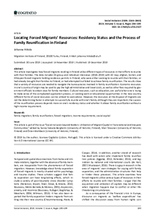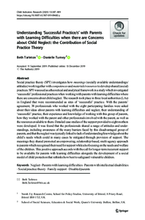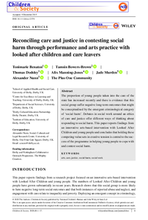

Displaying 661 - 670 of 1646
The research question examined in this study is whether unaccompanied minors (UAMs) in compulsory care receive more restrictive actions by compulsory care staff compared to their counterparts who are non-UAMs.
This article investigates how forced migrants residing in Finland utilise different types of resources in their efforts to reunite with their families.
In this video clip, poet Lemn Sissay discusses his experiences in care and his battle to get hold of his care files, among other topics.
Using Swedish registry national data, this study explored the relationship between immigration-country of birth status, psychosocial risk factors, and child compulsory care for parents with risky substance use (RSU).
Using Swedish registry national data, this study explored the relationship between immigration-country of birth status, psychosocial risk factors, and child compulsory care for parents with risky substance use (RSU).
This paper reports a small qualitative research study where 10 sets of grandparents were interviewed to explore their journey to becoming GSGs and to theorize their subsequent experiences.
Social practice theory (SPT) was used as a theoretical and analytical framework in a study which investigated ‘successful’ professional practices when working with parents with learning difficulties where there are concerns about child neglect.
The aim of the present study was to provide an exploratory account of foster carers’ lived experience of ending adolescent foster placements.
This paper reports findings from an innovative arts-based intervention with Looked After Children and young people and concludes that holding competing value sets in creative tension is central to the success of the programme in helping young people to cope with and contest social harm.
Using Swedish longitudinal register data on 2.167 children with experience of long-term foster care, this study explores the hypothesized mediating role of foster parents’ educational attainment on foster children’s educational outcomes, here conceptualized as having poor school performance at age 15 and only primary education at age 26.



